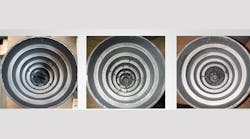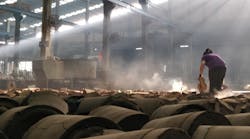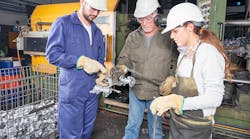Q: Our foundry produces heavily cored parts, pouring various types of metal in both no-bake molding and green sand molding lines. Like many foundries, we have enhanced our focus on sustainable processes and on being good neighbors ti our local and regional communities. Therefore, we are continuously looking for ways to reduce volatile organic compounds (VOCs), improve fence-line odors, improve employee working conditions, and reduce smoke generated during pouring, cooling, and shakeout.
Because we produce heavily cored castings there is a significant focus on our Phenolic Urethane Cold Box (PUCB) processes and the impact these systems have on the above-mentioned concerns. Are there new PUCB technologies available that would help us to address some of these concerns, and help us continue our pursuit of greater sustainability?
A: The answer is yes. There certainly are new PUCB offerings for metalcasting operations that can mitigate the concerns you are referencing.
As the acronym indicates, the PUCB process is based on the reaction of two components with polyurethane. A polyaddition of one component (Part 1), the phenol-formaldehyde resin, and the second component (Part 2), the isocyanate, is initiated through basic catalysis, usually by means of gassing with a tertiary amine. The hardening reaction is very fast, which makes the PUCB (or simply, cold box) process attractive for high-volume, high-productivity production of series components. The high strength level enables fast and automated core production with process reliability. The cores can be cast just a short time after production and feature high thermal stability, which also allows the dimensionally accurate production of water jackets or oil duct cores. Due to their almost pH-neutral properties, high proportions of mechanically or thermally treated used sands from cold box production can be reused.
Regarding VOCs, traditional PUCB’s are comprised of organic materials that will contribute to VOCs, odor, and smoke – and to some extent this is unavoidable. Nevertheless, the VOCs are generally a concern during coremaking and storage. The odor and smoke, however, are related to the pouring, cooling, and shake out of the casting.
These organic compounds are found in both the Part 1 and Part 2 of the binder system, so reducing the amount of binder or looking at newer formulations could help with the sustainability of your operation.
Frequently, optimizing the cold-box tooling can reduce the amount of binder and curing agent needed to produce a sound core. A baseline simulation of the tooling set-up often may lead to tooling modifications (e.g., vents / blow tubes) that would produce cores with less resin resulting in lower emissions. Arena-flow simulation software is commercially available to tooling engineers via ASK Chemicals Design Services Group. The Arena-flow software is remarkably precise and newer versions provide simulations that are extraordinarily accurate.
ECOCURE is a new platform of PUCB binders recently introduced to the foundry industry. With ECOCURE, ASK Chemicals is able to offer a PUCB binder system that produces lower volumes of VOCs, and produces less smoke and odor during pouring, cooling, and shakeout than traditional PUCB systems. These favorable attributes are possible without compromising the types of properties that are necessary for acceptable coremaking and sellable castings. The chemists at ASK Chemicals have engineered the ECOCURE platform using high-quality raw materials, with a focus on environmental features.
For more information on Arena-flow or ECOCURE contact your local ASK Chemicals representative or visit www.ask-chemicals.com
Join the Conversation. Email Your Questions for ASK Chemicals
Share your insights, opinions, and elaborate on the questions and the experts' answer(s). You must be logged in to the website in order to post your comments.









